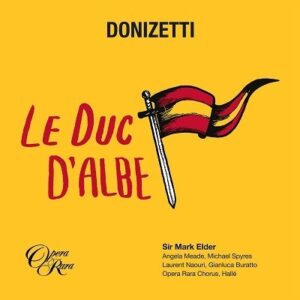It is ironic that the most famous—indeed, only famous—moment from this opera, the tenor aria “Angelo casto e bel”, was not composed by Donizetti. In fact, Donizetti abandoned the opera in Paris early in 1840 for other, more definite projects, and it was left unfinished when he died in 1848. Ninety-five percent of the first two acts are his; his student Matteo Salvi completed the last two acts. (Ponchielli had something to do with it as well.) It was finally performed, in Italian, in 1882. That version exists on CD in different live performances, one led by Thomas Schippers at the Spoleto Festival in 1959, and another, in French, in a version completed by Giorgio Battistelli from the Vlaamse Festival in 2012.
Opera Rara, in a performance led here by Mark Elder, has opted to record only the music completed by Donizetti, and therefore presents a two-CD set comprising only the first two acts. (The few missing moments—the five percent of orchestration and interstitial material, and a brief prelude—have been stitched in by Martin Fitzpatrick of the English National Opera.) I must admit that I approached this with skepticism, but it turns out to be a juicy 93 minutes of music.
The plot is the same as that of Verdi’s I vespri siciliani, except that we are now in 16th century Brussels under Spanish rule. The evil Duke of Alba has had the Flemish Count Egmont executed; it is the Count’s daughter, Hélène, who is our soprano heroine, and Henri de Bruges who is our tenor hero—the latter turns out to be the Duke of Alba’s son. We don’t get that information on this recording; it ends as tons of Flems wonder why Henri’s life is miraculously spared during an attempted uprising, and all shout for victory.
Elder leads a fine performance. There is a plethora of choral work, all of it top notch, and much of it led by a character named Daniel Brauer, who runs a brewery in Brussels where the good guys hang out and conspire. Brauer is sung by a gruff, rough-and-ready bass named Gianluca Buratta, who makes up in enthusiasm and vivid characterization what he lacks in Donizettian style. Hélène is sung by Angela Meade, a still up-and-coming American soprano who sings with rousing strength in her first-act call to arms, exhibits lovely legato and pianissimos in the second-act aria, and otherwise performs excellently in her various duets and ensembles. (It’s odd being the only female voice in the opera!)
Michael Spyres is our Henri, in an heroic role that is added to with a couple of spectacular high notes—an E-flat with Meade and a huge high D at the close of the second act. Laurent Naouri as the Duke is involved, but he sounds woolly and his singing somehow lacks focus. Perhaps it is the somewhat recessed recording—a bit of a matte finish—that gets in the way of real presence for all of the singers, but they all have everything but charisma.
All of that considered, I would not want to do without this set, though I must acknowledge that it may be for Donizetti completists. Still, at a time when he was composing—or about to compose—La fille du regiment, Don Pasquale, La favorite, Lucrezia Borgia, and more, how can one not want to hear this?
































